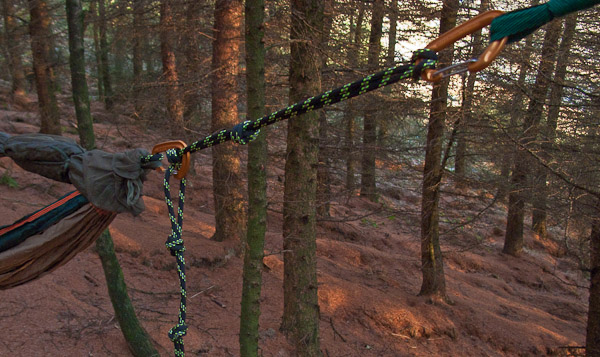Properly setting up a hammock can help to reduce wear and tear, drooping and coming into contact with the ground, vermin or pests. Unfortunately, a lot of people make the process more complicated and time-consuming than necessary. Let’s take a look at a few guidelines that will help you to get your hammock set up properly every time.
Spacing and Height

Most hammocks are pretty universal in size, and this makes finding the right spot easy. Look for two trees that are about 10-12 feet apart that are sturdy and not leaning inward. You want to place your straps or cordage about 6 feet above the ground. This will provide the optimal amount of tension for support while also keeping the hammock from drooping and touching the ground in most cases.
Rigging

The most important thing to consider is how you tie the hammock to the tree. You want to use webbing straps or some fabric whenever possible instead of rope or cordage. This will prevent fraying while also protecting the bark from the tree. It also provides more stability while giving the hammock a bit more bounce as well. Feel free to improvise by tearing strips of fabric from jeans, shirts or canvas if that’s all you have on hand.
Make the strips long enough to wrap around the tree and have a few inches of material remaining to tie into the rest of the hammock. You also want the material to be between 1-2 inches wide. The easiest way to tie the fabric to the hammock strings is by using a carabiner. However, you can also use any type of buckle you have on hand, or simply make a knot if all else fails.
The next step is to attach the rigging to the hammock lines. Again, using some type of buckle or connector will give you a lot of flexibility as the hammock sways under your weight. You want the base of the hammock to be about 18 inches above the ground, so you will need to adjust the cordage or rigging accordingly. Aim for connecting the rigging to the hammock lines at a 30 degree angle in relation to the trees. This will ensure that the hammock is taut enough while preventing it from sagging too close to the ground. You also want to attach the hammock line BELOW the rigging so that it will close once you are inside.
Additional Considerations

If you are using a tarp to make your hammock. Spread it out and position it in a diamond shape with respect to the trees. Point one corner toward one tree and the opposite corner toward the other. This will allow you to fold over the hammock and make adjustments as necessary. If you are placing the hammock over a slope, make sure that the bottom of the hammock rests about 18 inches above the highest point. Don’t worry so much about the end of the hammock, as this part will not droop as much.
When you are sleeping, sleep at a slight angle relative to the trees in order to provide you with the flattest sleeping position. Finally, you can create a ridge line that extends horizontally from either end of where the hammock line meets the rigging. This will allow you to drape a cover or some bug netting for additional protection and comfort.
Try this out for yourself, and see how easy it is to set up a hammock without the need to undo everything and start over while making adjustments.
